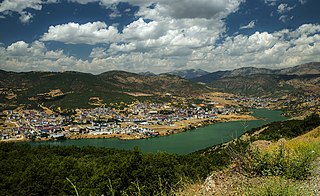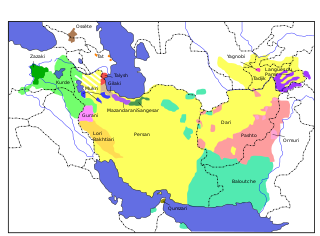Mehmet TayfunaliasMalmîsanij (born 1952 in Diyarbakır) is a Kurdish [1] [2] author and linguist. He mostly writes in Zazaki. [3] He often writes under the pseudonym Malmîsanij.
He studied at the University of Ankara, and was under arrest three times between 1975 and 1981 because of his political activities. In 1982, he moved to Sweden. He continued his studies in Europe. He studied Iranian studies at the Sorbonne University, Iranian languages at the University of Uppsala and folk education at the University of Linköping. He has a master's degree from the University of Gothenburg.
After Ehmedê Xasi and Usman Efendiyê Babijî who wrote the first works in Zazaki, in the late 19th and early 20th century, nobody wrote in Zazaki until 1970. Malmîsanij is the first author who started modern Zazaki literature in the 1970s. He published the first Zazaki dictionary in 1987. He and his friends published a magazine, named "Tîrêj", in the 1970s. This magazine was half Zazaki and half Kurmanji. He has written for several publications, including "Hêvî", "Armanc", "Çar çira", "Çira", "Wan", and "Vate". Some of his works have been translated into English, Arabic, French and Swedish.
He is a part of the "Grûba Xebate Ya Vateyî", [4] a group working on unifying the Zazaki language. He also takes part in the standardization of Kurmanji Kurdish.

Tunceli is a city and municipality in eastern Turkey. It is the capital of Tunceli Province, located in the middle of the Eastern Anatolia Region. The city has a Kurdish-majority population and was a site of the Dersim rebellion.

Zaza or Zazaki, is an Indo-European language spoken primarily in eastern Turkey by the Zazas. The language is a part of the Zaza–Gorani language group of the northwestern group of the Iranian branch. The glossonym Zaza originated as a pejorative and many Zazas call their language Dimlî.

Bingöl Province is a province of Turkey in Eastern Anatolia. The province was known as Çapakçur Province until 1945 when it was renamed as Bingöl province which literally means "thousand lakes" in Turkish language. Its neighboring provinces are Tunceli, Erzurum, Muş, Diyarbakır, Erzincan and Elazığ. The province covers an area of 8,125 km2 and has a population of 255,170. The capital is Bingöl. As the current Governor of the province, Kadir Ekinci was appointed by the president on the 5 November 2018.

The Zazas are a people in eastern Turkey who traditionally speak the Zaza language, a western Iranian language written in the Latin script. Their heartland consists of Tunceli and Bingöl provinces and parts of Elazığ, Erzincan and Diyarbakır provinces. Zazas generally consider themselves Kurds, and are often described as Zaza Kurds by scholars.

Mehmed Uzun was a Kurdish writer and novelist born in Siverek, Şanlıurfa Province, Turkey. Though the Kurdish language was outlawed in Turkey from 1920 to 1990, he started to write in it and achieved much toward shaping a modern Kurdish literary language and reviving the Kurdish tradition of storytelling. In 1977–2005 he lived in exile in Sweden as a political refugee, becoming a prolific writer, author of a dozen Kurdish-language novels and essays, which made him a founding member of Kurdish literature in Kurmanji dialect. In June 2005 he returned to Istanbul. He was a member of the PEN club and the Swedish writers association. On May 29, 2006, he was found to have stomach cancer. After treatment at the Karolinska University Hospital in Stockholm, he returned to Diyarbakir, Turkey, where he died, aged 54.
Mela Huseynê Bateyî was a Kurdish poet and cleric. He laid the foundations for Kurdish mawlid literary genre since almost all Kurdish mawlids are influenced by him.
Zeynelabidîn Zinar is a Kurdish writer and researcher. He was born in the village of Hedhedk in the district of Beşiri in 1953. He has been one of the main figures in the area of Kurdish folklore. Moreover, he has changed many classical Kurdish texts from Arabic script to the Kurdish Latin-based script. Between 1986 and 2006, he has published around seventy books in the Kurdish language. His main work is a ten volume book on the Kurdish folklore and oral traditions, called Xwençe. It took him twelve years to complete this work, and its twelve volumes were published between 1989-1997 in Sweden.
Mehmed Emîn Bozarslan, is a Kurdish writer. He was born in Diyarbakır in south-eastern Turkey. He moved to Sweden as political asylum seeker in 1978, and he has been living in Uppsala Sweden since then. The most famous of his early works was Alfabê which was the first ABC-Book for Kurdish learning that was published in Turkey in 1968. The books were impounded immediately by a Turkish court. Emin was arrested and jailed under separatism charges. He was released after a while but jailed again in another occasion under military regime from spring 1971 to summer of 1974. He moved to Sweden as political asylum seeker in 1978, and he has been living in Uppsala, Sweden since then.

Kurdish literature is literature written in the Kurdish languages. Literary Kurdish works have been written in each of the four main languages: Zaza, Gorani, Kurmanji and Sorani. Ali Hariri (1009-1079) is one of the first well-known poets who wrote in Kurdish. He was from the Hakkari region.

Hekimhan is a town and district of Malatya Province of Turkey. The mayor is Turan Karadağ (CHP). It is located in the upper Euphrates in Eastern Anatolia. The district population is 25,629. Hekimhan is 1,075 m above sea level. The highest point in Hekimhan is Zurbahan mountain.
Kurdish Institute of Istanbul, founded in 1992, was an organization focusing on Kurdish literature, language and culture. Kurdish and Turkish intellectuals such as Musa Anter, Yaşar Kaya, İsmail Beşikçi, Cemşid Bender, Feqî Huseyîn Sagniç, Abdurrahman Dürre, İbrahim Gürbüz and Süleyman İmamoğlu were among the founding members.

Nazımiye is a town and district of Tunceli, Turkey. The town has a population of 1,636. It was also known as Kızıl Kilise.
Celîlê Celîl (1936–present) is a Kurdish historian, writer and Kurdologist. He was born in Yerevan to a Yazidi Kurdish family and studied history at the university of Yerevan and Oriental Academy of Leningrad. He wrote his thesis regarding the Kurdish rebellions in the 19th century. He received his PhD in 1963, and worked in the Academy of Sciences from 1963 to 1993. He along with his brother Ordîxanê Celîl, collected Yazidi religious poetry and Kurdish legends and tales. After the collapse of Soviet Union, he moved to Austria, and taught at the University of Vienna, where he taught Kurdish. He is now working at the Academy of Sciences in Vienna.

Rohat Alakom is a Kurdish author from Kars, Turkey who writes his books in Kurdish, Turkish and Swedish. He was born in a village of Kağızman a district of Kars Province. He went to high school in Kağızman, Later, he went to the capital of Turkey Ankara for higher education. After living in Bulgaria (1979–1980) and Germany (1980–1982) he went to Sweden. He is currently living in Sweden.
Mustafa Aydogan is a contemporary Kurdish writer and translator. He was born in the district of Kızıltepe in Mardin in southeastern Turkey and relocated to Sweden in 1985. He has translated works of renowned authors such as Jack London, Yaşar Kemal, Aziz Nesin and Orhan Pamuk into Kurdish.

Kamal Sido Kurdaxi is a Kurdish interpreter, translator, and author of several publications in Kurdish, Arabic, Russian, German, and Turkish.
Zaza nationalism is an ideology that supports the preservation of Zaza people between Turks and Kurds in Turkey. The movement also supports the idea that the Zaza people are a different ethnic group from Kurds.
Gülşat Aygen PhD, MA, BA is a linguist, educator, author, editor, and translator born in Turkey. Dr. Aygen's research agenda includes both theoretical and applied linguistics, encompassing morphosyntax, language education, and many Turkic languages, particularly Turkish, her native language. She is currently a distinguished teaching professor of linguistics at Northern Illinois University.
Evdilsemedê Babek or Abdussamed Babek was a Kurdish poet who with Ali Hariri were the first to write in Kurdish (Kurmanji). Beside Kurdish, Babek also wrote in Arabic and has been described as the first Kurdish poet to emerge after the spread of Islam among Kurds.
Kurdish institutes are research institutions established in different countries to conduct research and publications on the Kurdish people, culture, and/or language. The oldest and best known of Kurdish institute is the Kurdish Institute of Paris, which was established in 1983.